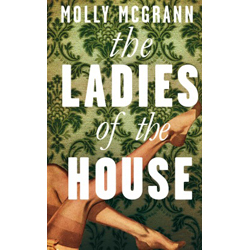 Published: 2015
Published: 2015
Author: Molly McGrann
Problematic but perfect for book groups

Three elderly people die in a dilapidated Primrose House. At the same time, Marie Gillies, a middle aged woman who has never met any of these people feels immediately responsible when she finds out about their deaths. What is the connection between the four people and is Marie actually responsible? The answer lies in Molly McGrann’s novel The Ladies of the House, the current BBC Radio 4 Book at Bedtime.
Arthur Gillies is a man with a double life. He is married to the devoted Flavia who stays in Kettering with their daughter Marie while Arthur works in London on “business”. Unbeknownst to Flavia and Marie, Arthur’s business is prostitution. He runs 20 high class brothels in the capital, attracting girls from all over the country. When he dies he stipulates that the aging escorts be allowed to live in the houses sparking the tragic events at the very beginning of the novel.
The Ladies of the House is a strange book. I enjoyed it a lot while reading it and I whizzed through it, reading it any spare minute I had. There’s a niggle in my head though that makes me unsure of how I really felt about the novel. It’s well written and there are some beautiful little scenes dipping into the lives of various characters but it all felt quite disconnected and disjointed. I appreciate that may have been part of the narrative – Arthur’s two lives and the women in them were so completely separate that it makes sense that their stories would never dovetail.
I did take issue with the portrayal of prostitution here. There were some nods to the violence and coercion involved in the sex trade but there was also a degree of romanticising the girls’ lives. Happy hookers living together in beautiful houses – what did it matter if they got the odd slap?
Another concern with The Ladies of the House was that I felt quite estranged from all of the characters. We never get to really know them and that makes it hard to truly empathise with their lives (and deaths). All bar one of the main characters has the potential to be a fascinating hero of their own story and deserves better than sharing the limelight.
I realise this sounds quite harsh and I don’t mean to be, I did enjoy it while reading and a couple of days on I’m still thinking about the story and the characters. This is a perfect book group read – I can see lots of debate about some of the points I’ve raised amongst others. People will be arguing about its merits and faults for a good while. That alone makes it a worthwhile addition to your Spring 2015 reading.
